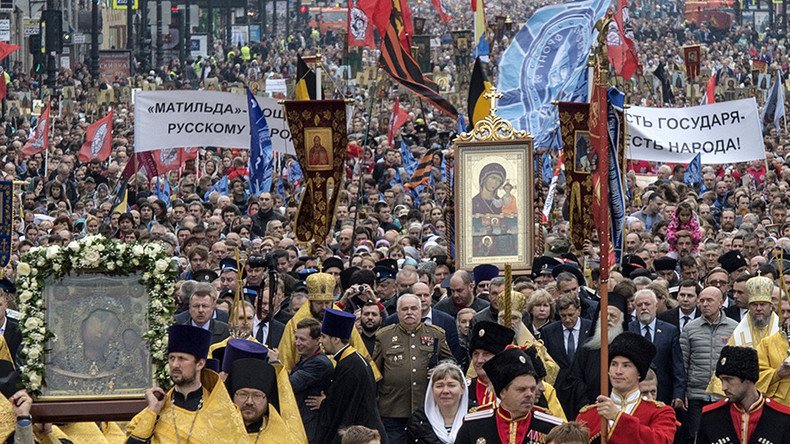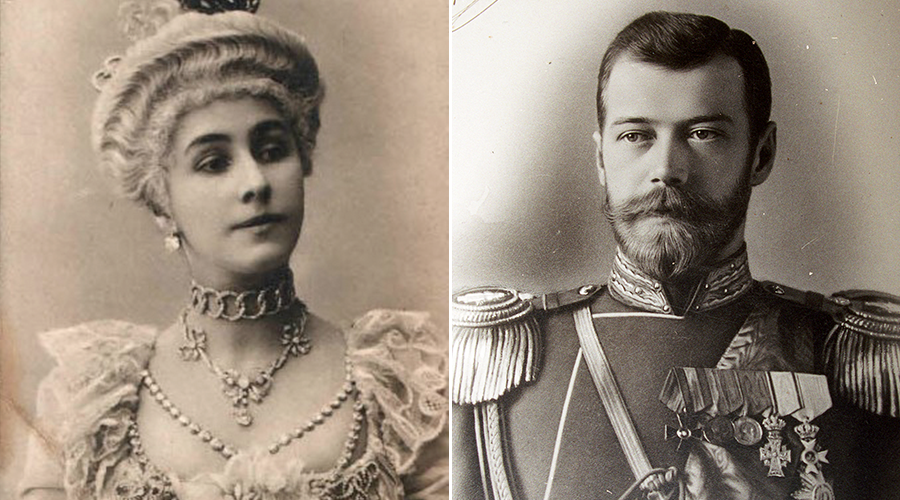Blasphemy, porn allegations, arson: How Russian Tsar love affair movie created furious debate

The most-discussed film in Russia – a dramatized story about the last Russian tsar, recently canonized and his love affair – has yet to even be released in the cinemas, but has nevertheless sparked a heated debate about the role played by religion in Russian society and the curtailment of artistic freedoms.
On Tuesday, some 100,000 Russian Orthodox believers in St. Petersburg walked in a solemn procession headed by the archpriest of the diocese, Metropolitan Barsanuphius. Among the red flags with a depiction of Prince Alexander Nevsky, a venerated saint of the Church, one could see a plain black-on-white banner declaring: “Matilda is a slap in the face of the Russian people.”
The banner was referring to ‘Matilda’, a movie which has been in the focus of heated debate for months, even though the general public is yet to see it. Featuring the tagline “The secret of the Romanovs,” it depicts a love affair between the last Russian tsar, Nicholas II, and Mathilde Kschessinska, a Russian prima ballerina, a lover to several men of the Russian royalty and eventually the wife of one of Nicholas’ cousins.
The costume drama was scheduled to be released in theaters in late October, but that remains in question, considering the amount of criticism the film currently faces, and even some cases of violence.

As the Russian authorities refused to keep the movie from theaters, the fight against it became increasingly ugly and violent. In late August, somebody threw three petrol bombs into the window of Uchitel’s studio in St. Petersburg, an act that public critics of the film called “a provocation of the unbelievers.”
On Monday this week, somebody torched two cars parked in front of the Moscow office of a law firm representing the film’s director, leaving a note saying “Burn for Matilda.”

The most serious incident happened last week, when a man drove a truck loaded with several gas canisters into a movie theater which was scheduled to screen ‘Matilda’ in Ekaterinburg and set it on fire. The arsonist was detained and, according to some media reports, later told police that he was protesting against the film.
In the wake of the incidents, one of Russia’s largest theater chains this week announced that it will not show ‘Matilda’ due to security risks. The decision sparked angry rebukes from some filmmaking professionals and civil rights activists, who called it “self-censorship.”
The Kremlin has been trying to distance itself from the escalating confrontation, even as an increasing number of officials were drawn into it. Presidential spokesman Dmitry Peskov on Wednesday stressed that violence was not the answer.
“This all is taking truly ugly form now, this hysteria. All those extremist actions, the attempts to pressure the cinemas are absolutely not acceptable and dangerous, just as any other form of extremism is. Of course, the law enforcement should act accordingly,” Peskov told journalists.
Even Russia's conservative culture minister Vladimir Medinsky has asked the police to investigate "out-of-control" religious activists, who are spreading "lawlessness."
The first public criticism of the flick, directed by Aleksey Uchitel, erupted last year, after the first trailer of ‘Matilda’ gave a glimpse of what it will be: a passionate love story with sex scenes and the royal protagonist torn between his duty as the future ruler of Imperial Russia and his beautiful lover.
Some Russian Orthodox activists consider such a depiction of Nicholas II blasphemous. The deposed emperor was canonized in 2000 as a ‘passion bearer’, a titled reserved for deeply-religious individuals who died violent deaths, but unlike martyrs did not die for the faith per se. This honor was bestowed on him and other members of the Romanov family who were executed by the Bolsheviks in 1918.
Leading the charge against the movie was MP Natalia Poklonskaya, who made extraordinary efforts to have it banned. She used her position as a lawmaker to request an investigation by the General Prosecutor’s office, petitioned the Culture Ministry to deny it a screening license, and even filed a civil lawsuit aiming to protect Nicholas II’s good name from alleged slander.
The film seemingly does take artistic liberties and deviates from historical truth for the sake of dramatic effect. For example, it depicts the love affair as lasting beyond the tsar’s marriage and becoming a love triangle – which is understandably more scandalous than just sex.
Another major irritating factor for the hardline critics is the casting of German actor Lars Eidinger as Nicholas. Among his previous work is a Dutch film called ‘Goltzius and the Pelican Company’, which is rated 16+ in the Netherlands and features plenty of risqué scenes, including full-frontal nudity and simulated sex. Eidinger was branded a “porn actor” by some critics of ‘Matilda’, who saw the casting choice as yet another insult to the tsar.
WARNING: Content may not be suitable for children
The reaction of the film crew to the criticism was arguably not helping. While publicly trying to placate critics, they occasionally seemed to goad them. For instance, the second trailer of ‘Matilda’ featured phrases like “Love of a woman like that will make you as God intended you to be” and “Our theater is better than a whorehouse.”
Uchitel alleged in one interview that Poklonskaya’s campaign was motivated by her being in love with Nicholas II. And some defenders of the movie on the social media, who saw the crusade against ‘Matilda’ as an attempt to impose religious censorship on Russia, didn’t hesitate to call opponents names such as ‘Russian Orthodox Taliban’.
Ironically, the pre-release screening of ‘Matilda’ in Vladivostok on Monday has left viewers somewhat disappointed.
“It’s a typical fantasy melodrama and a triumph of free creative spirit. Aleksey Uchitel and the writer slackened the reins and reminded viewers about the most treasured modern value –freedom of self-expression. The only thing this film can insult is good taste. But the importance of kitsch in modern culture cannot be denied,” movie critic Andrey Vasilenko told Russian website the Village after watching ‘Matilda’.
“I liked the film. It’s beautiful and has good camera work. The props are awesome, every detail on the costumes stands outs. I didn’t see anything vulgar. They just showed breasts three times, but it was tasteful,” said another man.











